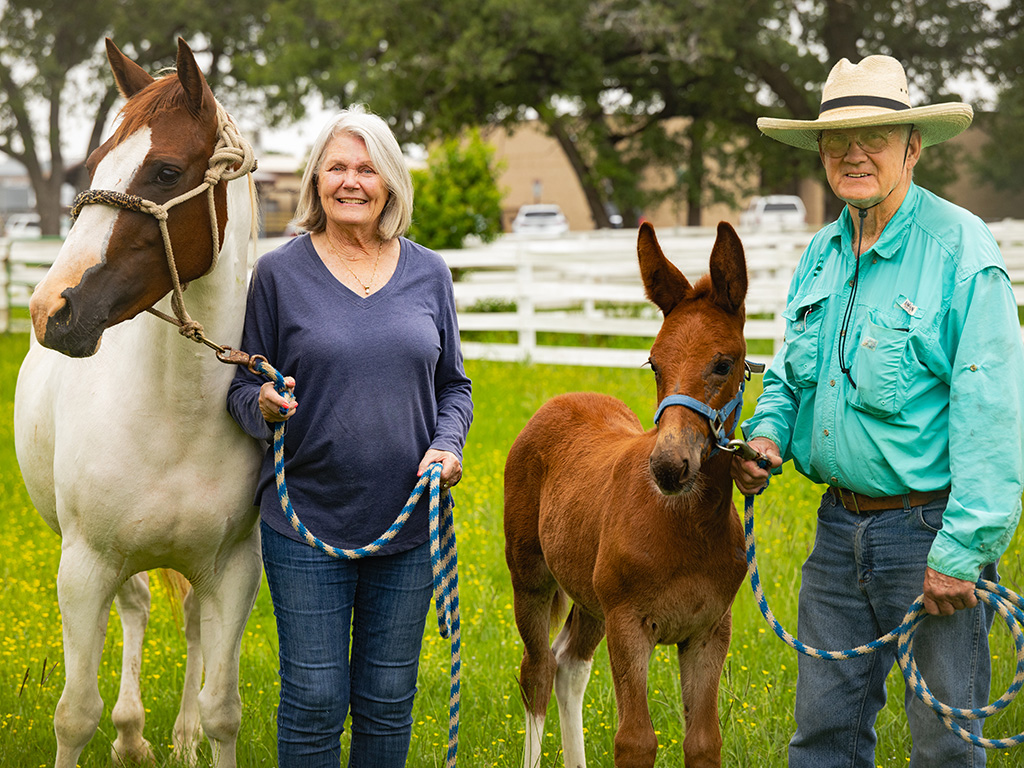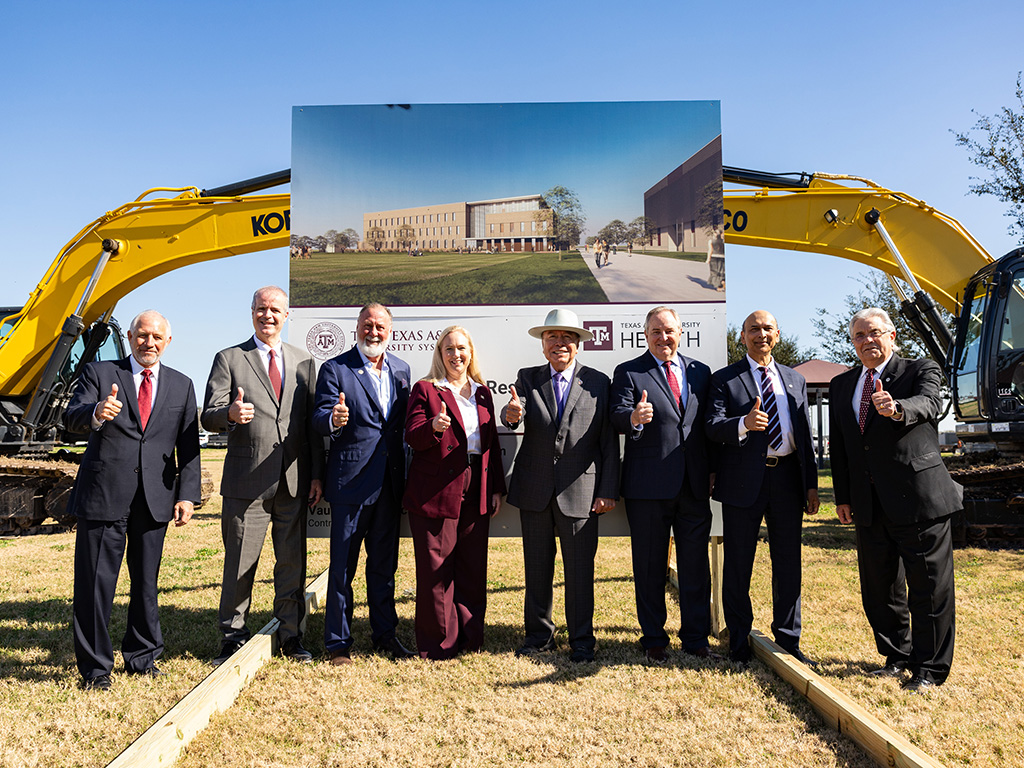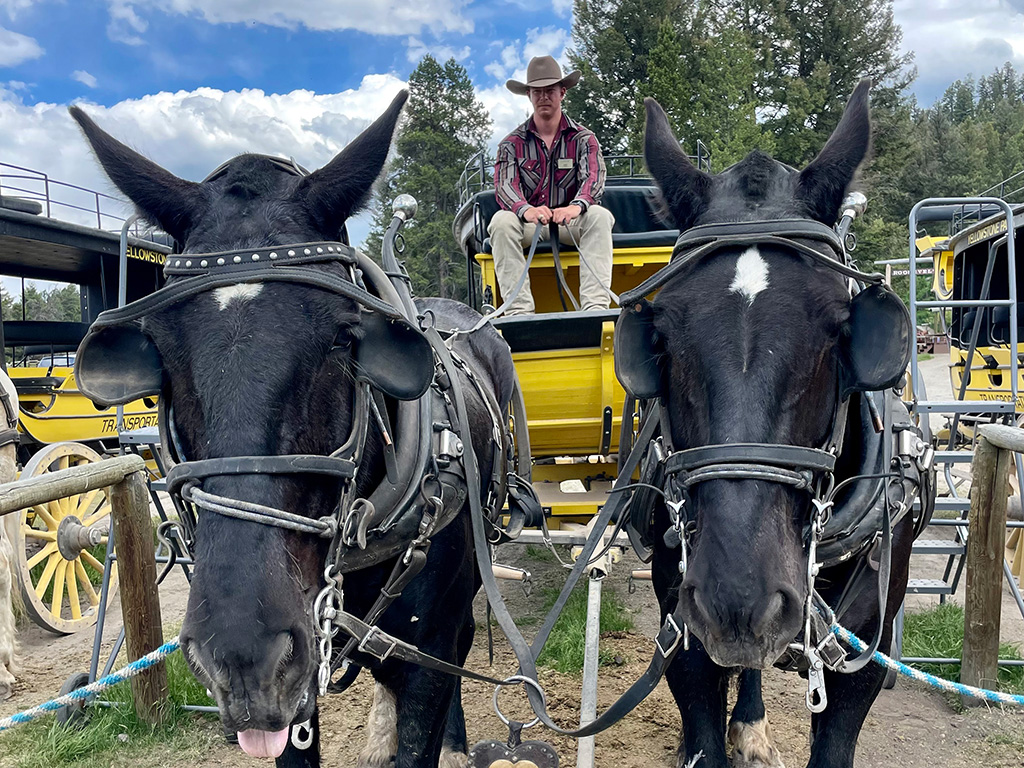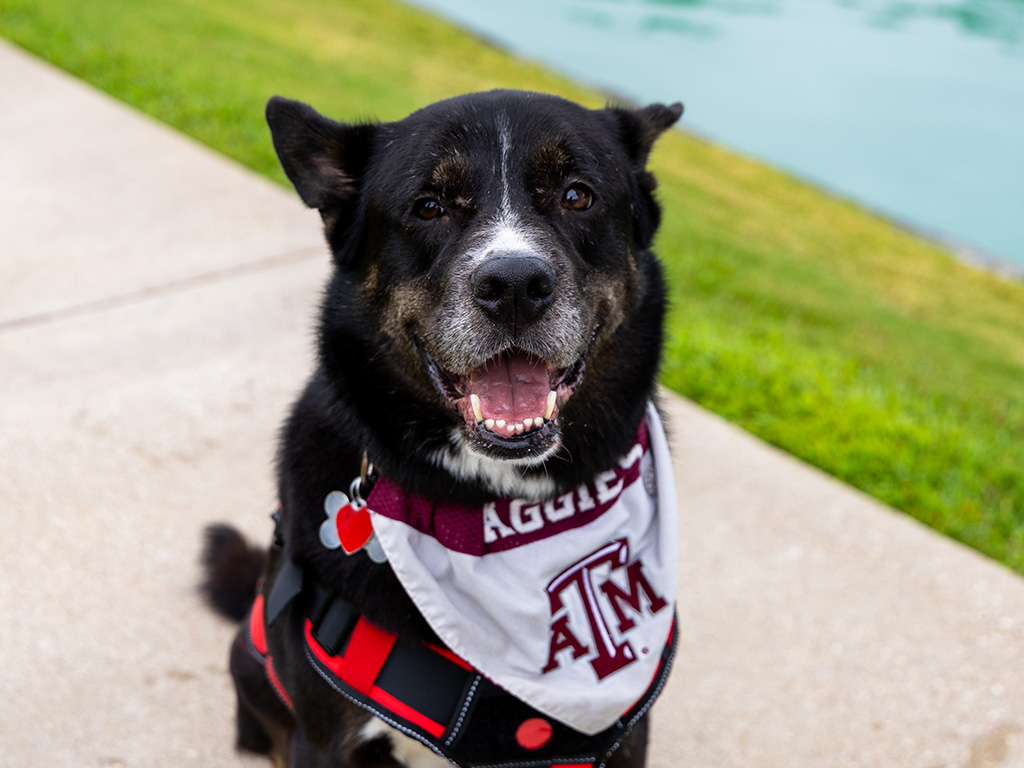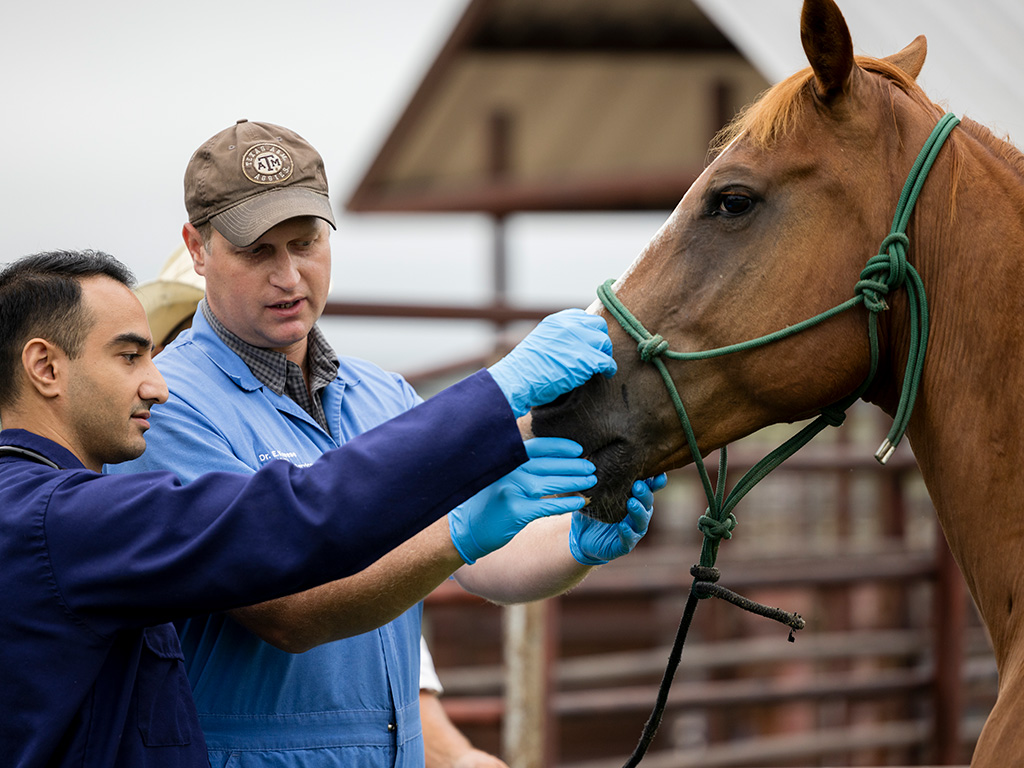Graduating Texas A&M Student Practices Community Leadership Through Veterinary Medicine
Story by Courtney Price, VMBS Marketing & Communications
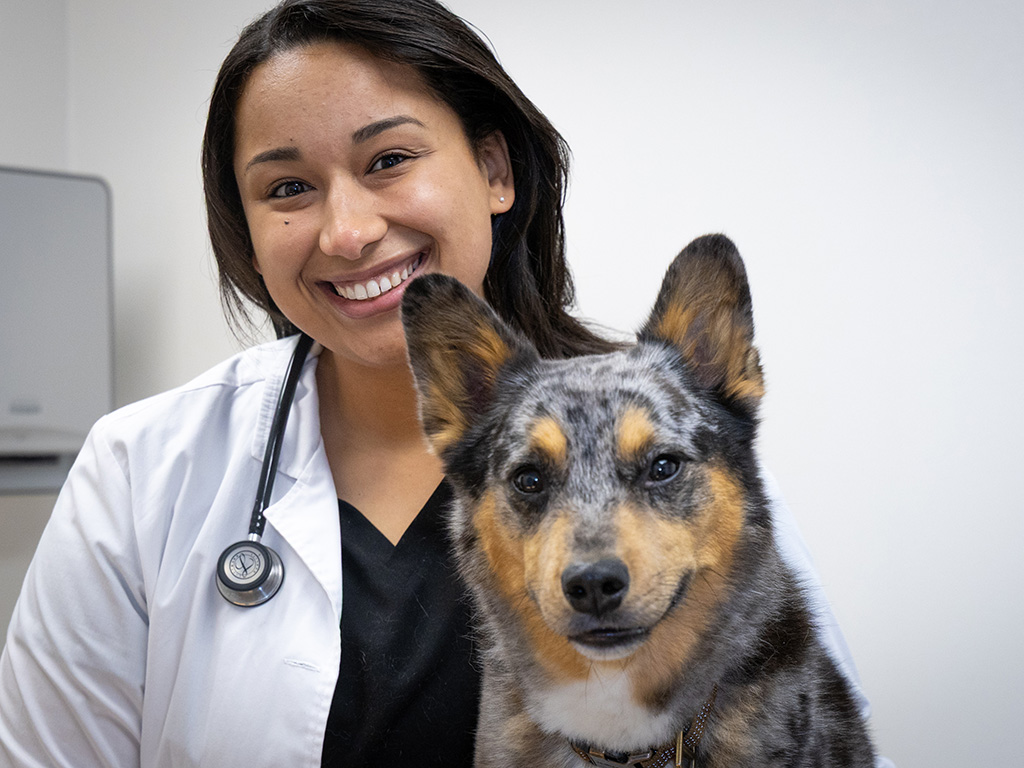
Having lived all over the world while her parents worked for the United States military, fourth-year Doctor of Veterinary Medicine (DVM) student Christina Edlebeck knows the importance of building strong communities and welcoming outsiders.
As she completes her final semester at the Texas A&M College of Veterinary Medicine & Biomedical Sciences (VMBS), Edlebeck is preparing to serve rural communities, which excites her not only because of the ability to work with different kinds of animals but also the opportunity to get involved with small town community leadership.
“I grew up immersed in many different cultures — including Germany, Japan, and the U.S. I like to think that these experiences taught me to keep an open mind about patients’ owners, including their financial circumstances and their relationship with their animals,” Edlebeck said.
Edlebeck is also looking forward to putting to work the strong community-centric values she learned through the VMBS’ 2+2 DVM program, through which students attend their first two years of veterinary school at the Veterinary, Education, & Outreach (VERO) campus in Canyon, Texas. Afterward, students move to College Station for their third and fourth years.
“VERO is a family,” Edlebeck said. “Our professors really go above and beyond for us. Being part of such a tight community helped me understand the leadership role I can play as a veterinarian in a small town.”
Discovering The Value Of Community
Traveling around the globe with her family gave Edlebeck the opportunity to experience many different cultures and taught her the importance of making others feel welcome.
“My earliest memories were from Germany,” she said. “Then we moved to Wisconsin, to Kansas, to Okinawa, Japan, and then back to Germany when I was in middle school.
“The first move back to the U.S. was a little hard, especially with adjusting to a new school while I was so young. I remember that we moved to a small town, and it was kind of hard being an outsider. I remember not wanting to ever make anyone feel that way,” she said.
But along her journey, Edlebeck also found that close-knit communities can be welcoming to outsiders.
“When we moved to Okinawa, there was a huge culture shock, but the people are so friendly and welcoming. I thought that was so beautiful, and it made it possible to appreciate their culture so much more,” she said.
While, at times, moving frequently made it difficult to build relationships with people, Edlebeck found that animals were always easy to befriend.
“My parents didn’t really share my enthusiasm for animals, but they tried to give me opportunities to develop my passion wherever they could,” she said. “I remember going to petting zoos in Germany to see the goats, sheep, and chickens. Then, in Japan we befriended a stray dog that ended up becoming our pet. Those experiences helped me realize that I wanted to be a veterinarian.”
Joining The Aggie Family

Even while on the other side of the world, Edlebeck started to learn about Texas A&M and the VMBS’ reputation as a veterinary school.
“I can remember hearing about College Station while in Japan and thinking it must be a train station,” she said. “But then I learned about the veterinary school and started thinking that I might want to go there.”
When her family moved back to the U.S. during her high school years, Edlebeck’s mother accepted a job teaching at Prairie View A&M University — only 50 miles southeast of College Station — allowing her to learn even more about the university.
“The core values, especially Selfless Service and Leadership, are really important to me,” she said. “Texas A&M feels like a family, and I appreciate the sense of belonging.”
In 2021, Edlebeck graduated from Texas A&M with a bachelor’s degree in wildlife and fisheries sciences and a minor in public health. Afterward, she joined the VMBS’ 2+2 VERO program, which offers student-faculty ratios that are almost one-to-one; there, students also have plentiful opportunities to experience rural and food animal practice.
“Studying at VERO was an incredible experience,” Edlebeck said. “I have so many fond memories of the faculty there. Dr. Susan Eades, the head of the VERO program, is like a mama bear. She’s always looking out for us, though she’s also not afraid to beat us in a game of volleyball.
“My clinical pathology professor, Dr. Yvonne Wikander, had an open door policy for us, which we called ‘tea time with Dr. Wik’ because she had a wall of teas and would encourage us to make a cup, sit down, and talk about anything we had questions about. I often took her up on that,” she said.
Developing A Passion For Servant Leadership
Edlebeck’s experiences in the DVM program have only solidified her desire to fully embrace the community leadership element of veterinary medicine.
One of her favorite memories is volunteering for Veterinary Education Day, an annual event hosted by the VMBS’ DVM students designed to inspire elementary-aged children with a passion for veterinary medicine.
“It was so important to me because seeing all those kids took me back to my childhood and how much I loved animals,” she said. “I also thought about how important it is for kids to have diverse representation, so they see people who look like them and realize they can have a career doing this in the future. I wanted them to think, ‘I love animals and there is a place for me here.’”
After her second year, Edlebeck also attended the Veterinary Leadership Experience, a week-long intensive leadership training program hosted by the Veterinary Leadership Institute.
“One of the most important ideas I took away from the program was the concept of servant leadership,” she said. “When you are a veterinarian, you are a leader in your practice, and you need to step up and be committed to the personal growth of the people who work in the clinic with you. If they want to learn a new skill, you need to be supportive and be a good steward of the profession. You have to remember that everything is much bigger than you and your own goals.”
The First Steps On A New Journey
Once graduation is behind her, Edlebeck plans to join Rochelle Veterinary Hospital in Rochelle, Illinois, a small town near where her family currently lives.
“When I did the (fourth-year, clinical) rural medicine rotation with Drs. Joe and Carol Hillhouse at Carson County Veterinary Clinic, I really got to see their role as significant members of the community and how they got to know their clients really well,” she said. “That and the variety of cases really helped me decide to practice in a rural area.
“I joined the Rochell clinic for a different rotation and discovered that it’s a really charming town with very welcoming people,” she said. “I’m looking forward to joining the only other veterinarian in town, who has more than 22 years of experience, and seeing how we can continue to benefit the practice and the community together.”
###
For more information about the Texas A&M College of Veterinary Medicine & Biomedical Sciences, please visit our website at vetmed.tamu.edu or join us on Facebook, Instagram, and Twitter.
Contact Information: Jennifer Gauntt, Director of VMBS Communications, Texas A&M College of Veterinary Medicine & Biomedical Sciences, jgauntt@cvm.tamu.edu, 979-862-4216
You May Also Like

